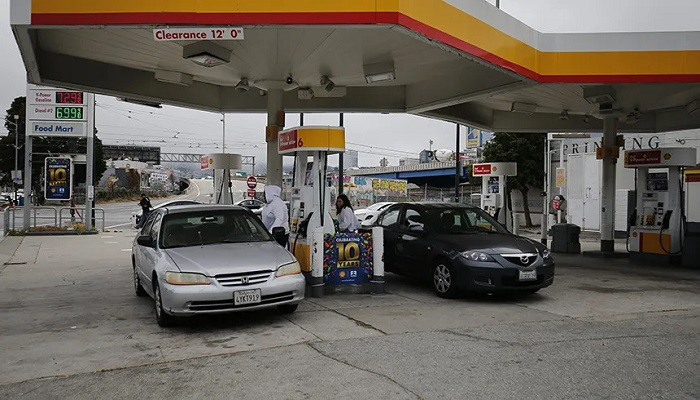US gas prices rise to a record $5 a gallon but Biden hedges on Saudi Arabia visit
 US gasoline prices, a key driver of the highest inflation seen in the US in 40 years, hit a record $5 a gallon on Saturday. There was little to suggest they would drop anytime soon but, also on Saturday, Joe Biden said he had “not yet” decided if he will travel to Saudi Arabia, a week after opening the door to a possible trip. Any such visit would be aimed at bolstering relations with the country at a time when Biden is trying to find ways to lower gasoline prices. Many on the US right blame the high prices on the president. Others blame the Russian invasion of Ukraine. Democrats accuse oil companies of price gouging. In fact prices have been surging since April 2020, when the shock of the coronavirus pandemic drove gasoline under $1.80 a gallon, according to government figures. Prices hit $3 in May 2021 and passed $4 this March. On Saturday, the nationwide average for a gallon ticked just above $5, a record, according to auto club AAA. The average price jumped 18 cents in a week and was $1.92 higher than this time last year. State averages ranged from $6.43 in California to $4.52 in Mississippi. Global oil prices have been rising unevenly but sharply. The price of international crude has roughly doubled, with the US benchmark rising nearly as much. It closed on Friday at more than $120 a barrel. Several factors are pushing prices higher. Russia’s invasion of Ukraine and the resulting sanctions by the US and its allies have contributed to the rise. Russia is a leading oil producer. The US is the world’s largest oil producer but its capacity to turn oil into gasoline is down 900,000 barrels of oil a day since the end of 2019, according to the energy department. Tighter oil and gasoline supplies are hitting as energy consumption rises with the economic recovery. Also, Americans typically drive more starting around Memorial Day, at the end of May, adding to demand. Analysts say there are no quick fixes, as supply cannot be ramped up overnight, and if anything the global oil supply will grow tighter as sanctions against Russia take hold. European Union leaders have vowed to ban most Russian oil by the end of this year. The US has imposed a ban. “Defending freedom is going to cost,” Biden declared. The US could ask Saudi Arabia, Venezuela or Iran to help but each option carries moral and political calculations. Sources have said Biden is planning a trip to Saudi Arabia, Europe and Israel in late June. The White House has said the president feels that Saudi Arabia’s crown prince, Mohammed bin Salman, is a “pariah” for his role in the killing of the Washington Post journalist Jamal Khashoggi in Turkey in 2018. The Saudi government has denied any involvement by the crown prince. On Saturday, asked by a reporter later in Albuquerque, New Mexico, if he would make a trip to the Middle East, Biden said: “We’ll see.” A White House official said on Friday the US would not overlook conduct before Biden’s presidency, but that “it was also important to reorient – but not rupture – relations with Saudi Arabia”. Republicans have called on Biden to increase domestic oil production, for example by allowing drilling on more federal lands and offshore, or reversing his decision to revoke a permit for a pipeline that could carry Canadian oil to Gulf coast refineries. Democrats and environmentalists say that would undercut efforts to limit climate change. Even if Biden ignored a big faction of his own party, it would be months or years before those measures could lead to more gasoline at US pumps. At the end of March, Biden announced another tapping of the strategic petroleum reserve. The average price per gallon has jumped 77 cents since then, which analysts say is partly because of a refining squeeze. Some refineries shut during the pandemic, when demand collapsed. While a few are expected to boost capacity in the next year, others are reluctant to invest because the transition to electric vehicles will reduce demand. Higher energy prices hit lower-income families hardest. The National Energy Assistance Directors Association estimates that the 20% of families with the lowest income could be spending 38% of their income on energy including gasoline this year, up from 27% in 2020. Patrick De Haan, an analyst for the gas-shopping app GasBuddy, said: “There has got to be some point where people start cutting back, I just don’t know what the magic point is. Is it going to be $5? Is it going to be $6, or $7? That’s the million-dollar question that nobody knows.” On Saturday at a BP station in Brooklyn, New York, driver Nick Schaffzin blamed Putin for the $5.45 a gallon he was paying. “You just cut back on some other things – vacations, discretionary stuff, stuff that’s nice to have but you don’t need,” he said. “Gas you need.” George Chen said: “It’s going to be painful for people who don’t get pay increases right away. I can only imagine the families who can’t afford it.” |

Trump says Board of Peace members pledged over $5B for Gaza
269Yesterday, 21:39
EU plans crypto ban for Russia, FT reports
79411.02.2026, 00:48
US Treasury Secretary says US sanctions crushed Iran’s economy and sparked protests (video)
84706.02.2026, 10:43
Elon Musk just became the first person ever worth $800 billion after SpaceX acquired xAI
79004.02.2026, 18:30
Xi Jinping calls for China’s renminbi to attain global reserve currency status
74101.02.2026, 23:05
Trump signs order allowing US to impose tariffs on countries supplying oil to Cuba
78930.01.2026, 12:17
